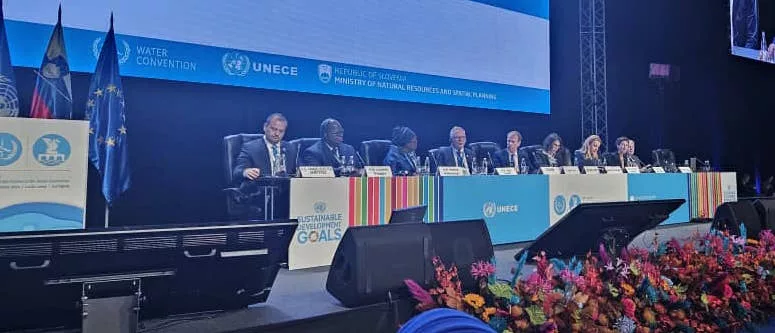|
Getting your Trinity Audio player ready...
|
A High-Level Segment of the 10th Meeting of Parties (MoP10) to the Water Convention in Ljubljana, Slovenia has demonstrated the importance of transboundary water cooperation.
Key dignitaries who attended the meeting include Zimbabwe’s Deputy Minister of Lands, Agriculture, Fisheries, Water and Rural Development Hon. Vangelis Peter Haritatos; H.E. Mr. Robert Golob, Prime Minister of Slovenia; H.E. Mr. Jože Novak, Minister of Natural Resources and Spatial Planning, Slovenia; Mr. Harry Liiv, Chair of the Meeting of the Parties, Special envoy for transboundary waters, Estonia; Ms. Tatiana Molcean, Executive Secretary of UNECE and United Nations Under-Secretary-General; and Ms. Sonja Koeppel, Secretary to the UN Water Convention, among others.
The sixth assessment report of the Intergovernmental Panel on Climate Change and the decisions of the twenty-eighth session of the Conference of the Parties to the United Nations Framework Convention on Climate Change (UNFCCC) (Dubai, United Arab Emirates, 30 November-12 December 2023) recognize that climate change impacts are often transboundary in nature and involve complex risks that can be addressed through climate-informed transboundary management.
They also emphasize the importance of water, inland water ecosystems, and the benefits of transboundary cooperation. For over thirty years, the Water Convention, serviced by ECE, has facilitated transboundary cooperation and, for over a decade has helped countries jointly adapt to climate change and improve intersectoral cooperation.
In his address, Hon Haritatos said Zimbabwe has successfully acceded to the two United Nations Global Water Conventions namely; the 1992 Convention on the Protection and Use of Transboundary Watercourses and International Lakes (the 1992 UN Water Convention) and the 1997 Convention on the Law of the Non-Navigational Uses of International Watercourses (the 1997 UN Watercourses Convention).
“This is a giant step forward as the accession places Zimbabwe on a firm pedestal to play its rightful role and to play a more meaningful part in transboundary water resources management at the global level.
“The accession process was completed in a rapid eleven months, making Zimbabwe the second country, after Senegal, in Africa to complete the process within a year. In the face of climate change, increasing population, and rapid economic growth, which are increasing pressure on the already constrained available water resources, cooperation is indispensable to address Africa’s water challenges. Zimbabwe becomes the 54th Party to the 1992 Water Convention, being the 11th African and 2nd southern African country, respectively, to join. Zimbabwe is the 39th Party to the 1997 Watercourses Convention, the 14th in Africa, and the third in the southern Africa region to join,” Hon Haritatos said.
He added that the UN global water conventions are powerful tools to promote and achieve the objectives of Vision 2030 and the 2030 Agenda for Sustainable Development and its Sustainable Development Goals (SDGs). They play a cardinal role in the realisation of the right to water and accelerating progress towards SDG 6 (clean water and sanitation) and its target 6.5 which calls upon all States to implement integrated water resources management at all levels by 2030, including through transboundary water cooperation.
Zimbabwe lies entirely in transboundary river basins with a total of 5 shared watercourses and one international lake. To promote international cooperation over shared waters, Zimbabwe has since the turn of the millennium signed various regional and bilateral basin agreements. This is illustrated by the result of the reporting exercise measuring progress to achieve SDG indicator 6.5.2 on transboundary cooperation, where the percentage of Zimbabwe’s shared waters covered by an agreement and institutional arrangement stands at 90.4% in the latest report submitted to UNECE and UNESCO in 2023.
According to the 2024 Water Cooperation Global Outlook Initiative undertaken by the International Centre for Water Cooperation, Zimbabwe’s water cooperation preparedness is in the High category. The accession to the global Water Conventions will undoubtedly prop up Zimbabwe’s profile on water cooperation and further consolidate the strong momentum for water cooperation in Africa, where over 90% of water resources are in 63 basins shared by two or more countries.






